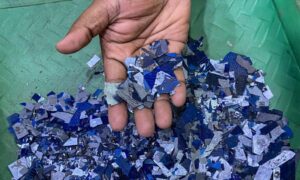
Under the scorching sun, a sea of solar panels gleams in the semi-arid landscape. Pavagada, 100 miles north of Bengaluru in southern India, is the world’s third-largest solar power plant, with 25m panels across a huge 50 sq km site, and a capacity of 2,050MW of clean energy.
India has 11 similarly vast solar parks, and plans to install another 39 across 12 states by 2026, a commitment to a greener future.
Yet this solar boom has a downside: the waste it generates from the panels, made of glass, aluminium, silicon, rare-earth elements; as well as power inverters and wiring.
“While manufacturers claim decades of longevity, degradation of these panels sets in much sooner,” says Atif Mirza, director of Fusion Sprint Recycler, a solar-farm waste contractor in Uttar Pradesh. Panels can break during installation and transport or through exposure to monsoons and typhoons.
India’s solar ambitions come with a hefty amount of waste. With the nation targeting output of 280GW of solar power by 2030, of which 70.1GW is already installed, one study forecasts an accumulation of more than 600,000 tonnes of solar waste by then, with this projected to increase 32-fold to more than 19m tonnes by 2050.
About two-thirds of the waste is expected to originate from five states – Rajasthan, Gujarat, Karnataka, Tamil Nadu and Andhra Pradesh – which house eight of India’s 10 largest solar parks.
Naranaiah Amaranath, general manager at Karnataka Solar Power Development Corporation, which oversees the Pavagada solar park, acknowledges that while there are basic regulations regarding waste management, the responsibility largely falls on the private firms that own the solar plants.
Protocol dictates that solar waste from the plants must be transferred to e-waste contractors, authorised by the Central Pollution Control Board (CPCB), within a specified timeframe, typically 90 or 180 days.
However, practical and economic challenges abound. Site managers in Pavagada note that the selection of contractors is centralised, one company manages logistics for plants across India
“Most solar plants are located in remote areas, so the logistics and transportation is expensive, and once dismantled there is hardly any money from each individual part,” says Srinivas Vedula from EPragathi, a Bengaluru-based e-waste recycling company. “Plus, the solar glass has no value.”
Mirza, who is the official contractor for Ayana Renewable Power’s plants across India’s solar parks, including in Pavagada, says he sells dismantled parts to traders but admits: “We don’t know what they do with it.”
